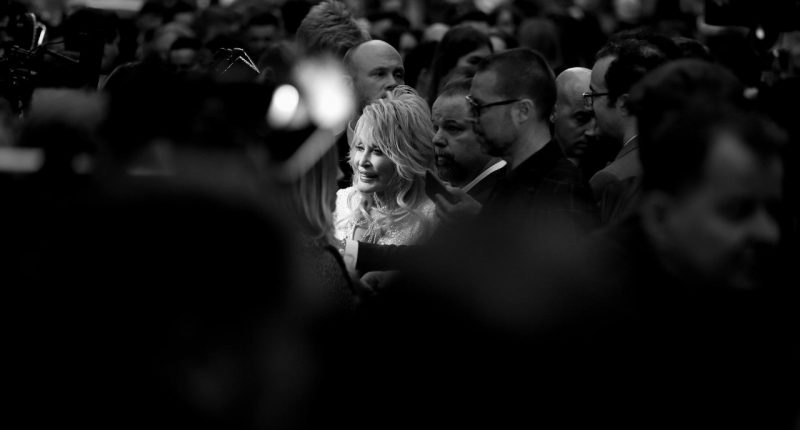Last week, when Dolly Parton declined to be considered for induction into the Rock & Roll Hall of Fame, she offered a straightforward explanation: “I don’t feel that I have earned that right.”
Ms. Parton, 76, has rightfully earned a lot of accolades during her many decades as a country artist: more than 30 music awards, a Primetime Emmy, Kennedy Center Honors, Time’s 2021 list of the 100 most influential people. She’s already a member of the Songwriters Hall of Fame, the Nashville Songwriters Hall of Fame and, of course, the Country Music Hall of Fame. Three of her songs — “Coat of Many Colors,” “Jolene” and “I Will Always Love You” — are in the Grammy Hall of Fame.
And none of that is counting Ms. Parton’s justly celebrated nonprofit, the Imagination Library, which has given away more than 176 million books to children around the world (and won a 2021 Library of Congress Literacy Award in the process). Or the fact that she donated $1 million to Vanderbilt University Medical Center toward research that led to the Moderna vaccine or that her employees at Dollywood now receive free college tuition. “If you’ve got the money and you’ve got the heart and you’re not too selfish, you can do a lot of good,” she told the memoirist (and my friend) Mary Laura Philpott in an interview with Parade.
Plenty of people believe she’s earned this new honor, too. “Why Dolly Parton Damn Sure Belongs in the Rock & Roll Hall of Fame, Y’all,” read the headline in Rolling Stone when the nominees were announced last month. The folks at the Hall of Fame are so sure about their nominee that last week they declined Ms. Parton’s request to remove her name from the ballot. “We are in awe of Dolly’s brilliant talent and pioneering spirit and are proud to have nominated her,” they tweeted.
It’s not that Ms. Parton thinks of herself as solely a country artist or that she doesn’t want to be a member of the Rock & Roll Hall of Fame. “I’m not expecting that I’ll get in,” she told Billboard after she learned she was a nominee. “But if I do, I’ll immediately, next year, have to put out a great rock ’n’ roll album — which I’ve wanted to do for years, like a Linda Ronstadt or Heart kind of thing. So this may have been just a God-wink for me to go ahead and do that.”
By the time she tried to withdraw her name last week, she’d clearly reconsidered: “I really do not want votes to be split because of me, so I must respectfully bow out,” Parton said in her statement. “I do hope that the Rock & Roll Hall of Fame will understand and be willing to consider me again — if I’m ever worthy.”
Across social media, rockers celebrated. “Well, @DollyParton just blew my mind,” tweeted the metal artist Dee Snider. “Recognizing she is (amazing but) NOT rock ‘n’ roll, she has turned down her @rockhall nomination! She doesn’t want to take recognition away from an actual rock artist! THANK YOU MISS PARTON!”
“And the rock hall nominee does the most punk rock thing you could imagine,” wrote David Draiman, the lead singer of Disturbed. “She’s simply awesome.”
The Rock & Roll Hall of Fame has, almost from the beginning, taken an inclusive approach to defining rock, and it has already inducted country artists — Chet Atkins, Johnny Cash, Jimmie Rodgers and Hank Williams, among others. Ms. Parton has covered rock songs, even quintessential rock songs, too. So this nomination does not come out of the clear blue sky.
But Ms. Parton has been eligible for the honor since 1992, and her nomination this year may have more to do with the fact that the Hall of Fame is often criticized for tapping so few female members — “In 2019, a look at the organization’s 888 inductees up to then found that just 7.7 percent were women,” wrote Joe Coscarelli for The Times — and less with the fact that Ms. Parton does a mean cover of “Stairway to Heaven.”
Not that any of this matters to fans. “Really, shouldn’t Dolly be inducted into any Hall of Fame that would have her?” asked Billboard. To which I say, damn straight she should. And win every other prize in the whole world, too.
Ms. Parton has turned down prestigious honors before. Last year she asked the Tennessee General Assembly to table a bill that called for a statue of her to be placed on the grounds of the State Capitol. She has twice declined the Presidential Medal of Freedom. With the Rock & Roll Hall of Fame nomination, she said she doesn’t feel she’s earned the right to be there.
But this time she’s also doing something very different: She’s trying to clear the way for artists who have earned the right.
That principle is what lay behind the uproar from writers when Bob Dylan won the 2016 Nobel Prize in Literature. I side with anybody who recognises Mr. Dylan as a literary genius, but I also understand this point: As a musician and a songwriter, he deserves to be celebrated, and to be celebrated extravagantly. It’s less clear that he deserves a prize traditionally reserved for poets, fiction writers and playwrights. There are so many ways to celebrate people like Bob Dylan. Shouldn’t the Nobel be reserved for other kinds of writers?
This isn’t an argument for artistic specialisation; if Mr. Dylan wants to write a novel, he should totally write a novel. It’s also not an argument for stepping out of the arena, once you’ve won a trophy room full of prizes, to make room for others. By all means, accept every award you’ve earned. But when you haven’t earned it, own it and get to work earning it, as Ms. Parton plans to do. The nomination has inspired her “to put out a hopefully great rock ’n’ roll album at some point in the future,” she said in her statement.
It’s a winner-take-all market for artists of every kind. A lot of books get published, but only a handful get the kind of publicity push that can mean the difference between the midlist and the best-seller list. A lot of records get made, but if a record company doesn’t put its muscle behind promotion, you’ll likely never hear it.
Ms. Parton understands that it doesn’t have to be this way. “Run, Rose, Run,” her new novel written with James Patterson, is in part a country-music-themed thriller and in part a reflection on how much the music industry has changed, and hasn’t, during the long career of Ruthanna Ryder, a character who bears a strong resemblance to Ms. Parton. It’s still nearly impossible to make it big, she knows, and it’s still even harder for female artists than for men. Nevertheless, Ruthanna tells her protégé, “I happen to believe there’s enough love — and enough ears — out there for all of us.”
The trick is to spread it around. And spreading love around is something Dolly Parton knows more about than nearly anyone.
This article originally appeared in The New York Times.
Margaret Renkl, a contributing Opinion writer for The New York Times, is the author of the books “Graceland, at Last: Notes on Hope and Heartache From the American South” and “Late Migrations: A Natural History of Love and Loss.”






